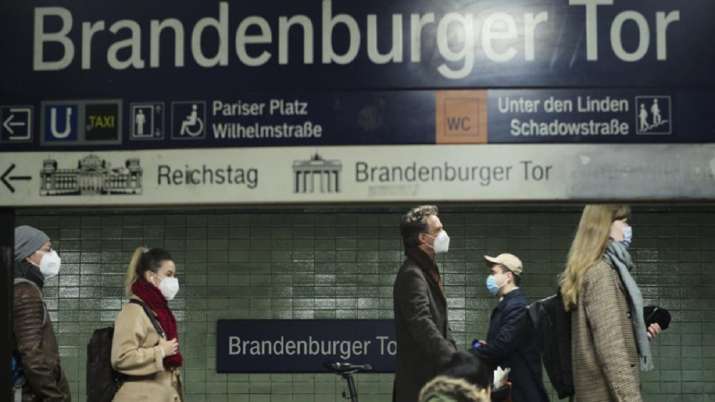
Passengers wearing face masks to protect against the coronavirus walk through the public transport station Brandenburger Tor in central Berlin.
Germany’s Centers for Disease Control is calling on people to cancel or avoid large events and reduce their contacts as the country’s coronavirus infection rate hits the latest in a string of new highs.
The centre, the Robert Koch Institute, said on Friday that Germany’s infection rate climbed to 263.7 new cases per 100,000 residents in seven days, up from 249.1 the previous day.
Germany reported 48,640 new cases on Friday, a day after the daily total topped 50,000 for the first time. Another 191 COVID-19 deaths took Germany so far in the pandemic to 97,389.
While the infection rate is not yet as high as in some other European countries, its continued increase in Germany has raised alarm bells. Outgoing Chancellor Angela Merkel plans to meet with the governors of the country’s 16 states next week, and parliament is considering legislation that would provide a new legal framework for sanctions over the winter.
“We must now do everything possible to break this momentum,” Health Minister Jens Spahn told reporters. Otherwise it will be a bitter December for the whole country.
In its weekly report released late Thursday, the Robert Koch Institute said it “advises to avoid immediate cancellations or major events if possible, but also minimize all other unnecessary contacts.” If such incidents cannot be avoided, people should take a test before participating, even if they have been vaccinated.
The head of the institute, Lothar Weiler, said on Friday that there are fewer usable hospital beds than at any time during the pandemic, with more than half of intensive care units reporting “acute staff shortages” as of January. in Germany during the last summit. ,
In the most affected areas, he said, the number of people attending large events should be reduced or the authorities should consider banning such events and closing bars or clubs.
Most German regions restrict access to many indoor facilities and programs to those who have been vaccinated against the virus, those who have recovered from COVID-19 or have recently received negative test results—the latter category is now considered an increasing number. has been put out. But enforcement is often sluggish.
Germany has recently struggled to bring new momentum to its vaccination campaign, with more than two-thirds of the population fully vaccinated, and has so far shied away from ordering a vaccine mandate for any professional group. . Officials also want to make sure people who were vaccinated months ago get a booster shot.
Spain said it would order a revival of free rapid COVID-19 tests, which were terminated a month ago, effective Saturday, in an effort to persuade more people to get vaccinated.
He said he favors limiting public events to those who are vaccinated and those who have recovered from COVID-19, and also need to be tested beforehand.
Germany on Friday declared neighboring Austria, effective on Sunday, a “high-risk zone”, which has a much higher infection rate. This means people arriving from Austria who have not been vaccinated or who have not recently recovered from COVID-19 will have to go into quarantine.
The Czech Republic and Hungary were also added to the list of “high-risk areas”, but the United States was omitted.
,